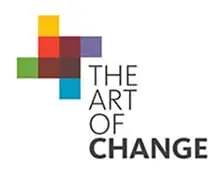Edwidge Danticat

Edwidge Danticat is a writer whose moving and insightful works across many genres enrich our understanding of Haiti and the complexities of the immigrant experience. She was born in Port-au-Prince in 1969 and moved to the United States when she was 12 years old. Her novels, memoirs, essays, short stories, and children’s and young adult books evoke the intricate layers of community, family, migration, isolation, and belonging.
Transcript
[The words “Art Is” appear, followed by scrolling words…Empathy, Political, Hope, Powerful, Social Change…it stops at Connection. Art Is Connection.]
Edwidge Danticat, novelist: The power of art is that it can travel throughout the ages.
[At a bookstore, Edwidge reads aloud from her book, “Claire of the Sea Light”.]
“There were times, though, that she wanted to just take off, leave Ville Rose, leave Haiti and never come back.”
Edwidge: In my writing, I’ve covered immigration. We’re always going through cycles of immigration where immigrants are scapegoated. I was separated from my parents for eight years, in Haiti, while they were working here in the United States. So, for me, that’s worth exploring, because the more we know about people, the less likely we are to be prejudiced against them.
[Edwidge reads aloud in a filled auditorium.]
“There was not much English spoken in the factories where she worked. Everyone there had come from someplace else.”
Edwidge: When we read a book or when we hear a story, we know that storyteller better than sometimes we know people in our own lives. We can take away many layers of ignorance by sharing our stories.
[The words “Art is” appear, followed by scrolling words…Connection, Expression, Change, Creativity, Healing…it stops at Justice. Hashtag Art Is Justice. Agree? Share this video.]
[Ford Foundation logo: a globe made up of a series of small, varied circles.]
Accessibility Statement
- All videos produced by the Ford Foundation since 2020 include captions and downloadable transcripts. For videos where visuals require additional understanding, we offer audio-described versions.
- We are continuing to make videos produced prior to 2020 accessible.
- Videos from third-party sources (those not produced by the Ford Foundation) may not have captions, accessible transcripts, or audio descriptions.
- To improve accessibility beyond our site, we’ve created a free video accessibility WordPress plug-in.
With spare yet lyrical prose, Danticat recounts the painful coming of age of a young girl in her first novel, Breath, Eyes, Memory (1994), then chronicles the past and daily struggles of nine women in her National Book Award-nominated story collection Krik? Krak! (1995), and then depicts the 1937 massacre of Haitian cane workers in the Dominican Republic in The Farming of Bones (1999). In The Dew Breaker (2004), a series of seemingly disconnected stories are revealed to revolve around the same traumatic events. Danticat’s 2007 memoir Brother, I’m Dying pays tribute to her father and his older brother Joseph, an 81-year-old asylum seeker, who died while in custody of the US Department of Homeland Security in 2004. Her 2011 essay collection Create Dangerously is an exploration of, among other things, how some artists come to their art and put it in the service of others during extremely difficult times. Her 2013 Carnegie Medal finalist novel, Claire of the Sea Light, shows a coastal town and its residents fighting to both exist and co-exist. In these and other works, she provides a nuanced portrait of the intersection between nation and diaspora, home and exile, and reminds us of the power of human resistance, renewal, and endurance against great obstacles.
Danticat has worked on several films, including the documentaries The Agronomist (2003), directed by Academy Award winner Jonathan Demme, as well as Academy Award nominee Richard Robbins’s Girl Rising (2013). She has appeared in Patricia Benoit’s Haitian diaspora-centered feature film, Stones in the Sun (2012). She has also written the libretto for composer Daniel Bernard Roumain’s 2015 opera Anacaona, and lyrics for Haitian American artists Pauline Jean and Emeline Michel.
Her most recent book, The Art of Death: Writing the Final Story, was published in July 2017. It is both a memoir of her mother’s 2014 death from ovarian cancer and a profound analysis of how other writers have written about death. Her short story collection, Everything Inside is Worth Dying For, will be published in 2019. Danticat is a two-time finalist for the National Book Award; the recipient of a National Book Critics Circle Award, an American Book Award, the Hurston/Wright Legacy Award, and the Dayton Literary Peace Prize; and she was a 2009 John D. and Catherine MacArthur Foundation Fellow.
